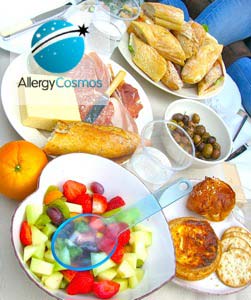In the largest food allergy study to date, researchers at John Hopkins Children's Center, and elsewhere, reveal that 2.5% of the US population has at least one food allergy. They also found a strong link between food allergy and asthma. This is a particularly valuable study - not just because of its size but because the researchers measured antibodies in the blood as well as asking participants if they have an allergy. So all reported cases of allergy were confirmed clinically.
The study involved more than 8,200 participants who suffer with allergies, aged between one and 60. The researchers investigated four different food allergies and for links between food allergies and asthma, eczema and hay fever. The most common food allergy was peanut allergy, affecting 1.5%of the population. Next came shrimp (1%), eggs (0.4%) and milk (0.2%). And 1.3% were affected by more than one food allergy. Allergies were most common in children aged five or younger, with 4.2% being affected. This age group was more than twice as likely to experience allergy symptoms as those aged over 20. Also, African-Americans were three times more likely to have a food allergy than white Americans, and men were twice as likely as women to be affected. Therefore, African-American boys were more than four times more likely as white women over 20 to have a food allergy.
Food allergies and asthma are linked, as food allergies are more common among those with asthma. For people with asthma, the risk of having a food allergy was increased four-fold compared to those who did not have asthma. And people with food allergies had a seven-fold increased risk of needing emergency asthma treatment compared to those without food allergy. People with food allergies were also more likely to be diagnosed with hay fever, but this link wasn't nearly as strong as the link between food allergy and asthma.
'Our findings confirm a long-suspected interplay between food allergies and asthma, and that person with one of the conditions are at higher risk for the other,' said investigator Dr Robert Wood, who is Director of Allergy and Immunology at Hopkins Children's Hospital. He notes how many children experience what he calls an 'allergic march', developing food allergy first, and then getting asthma and hay fever later. Does this sound familiar? While this research was not designed to identify a cause and effect relationship between food allergy and asthma, it certainly paints a compelling picture of the state of allergy today.
The best way to control allergy and asthma symptoms is to practice allergen avoidance. Check out our range of allergy and asthma friendly cleaning products from Allersearch and filter the air in your home with the use of an effective air purifier.
Source: Liu A National prevalence and risk factors for food allergy and relationship to asthma: Results from the National Health and Nutrition Examination Survey 2005-2006 Journal of Allergy and Clinical Immunology October 2010.




